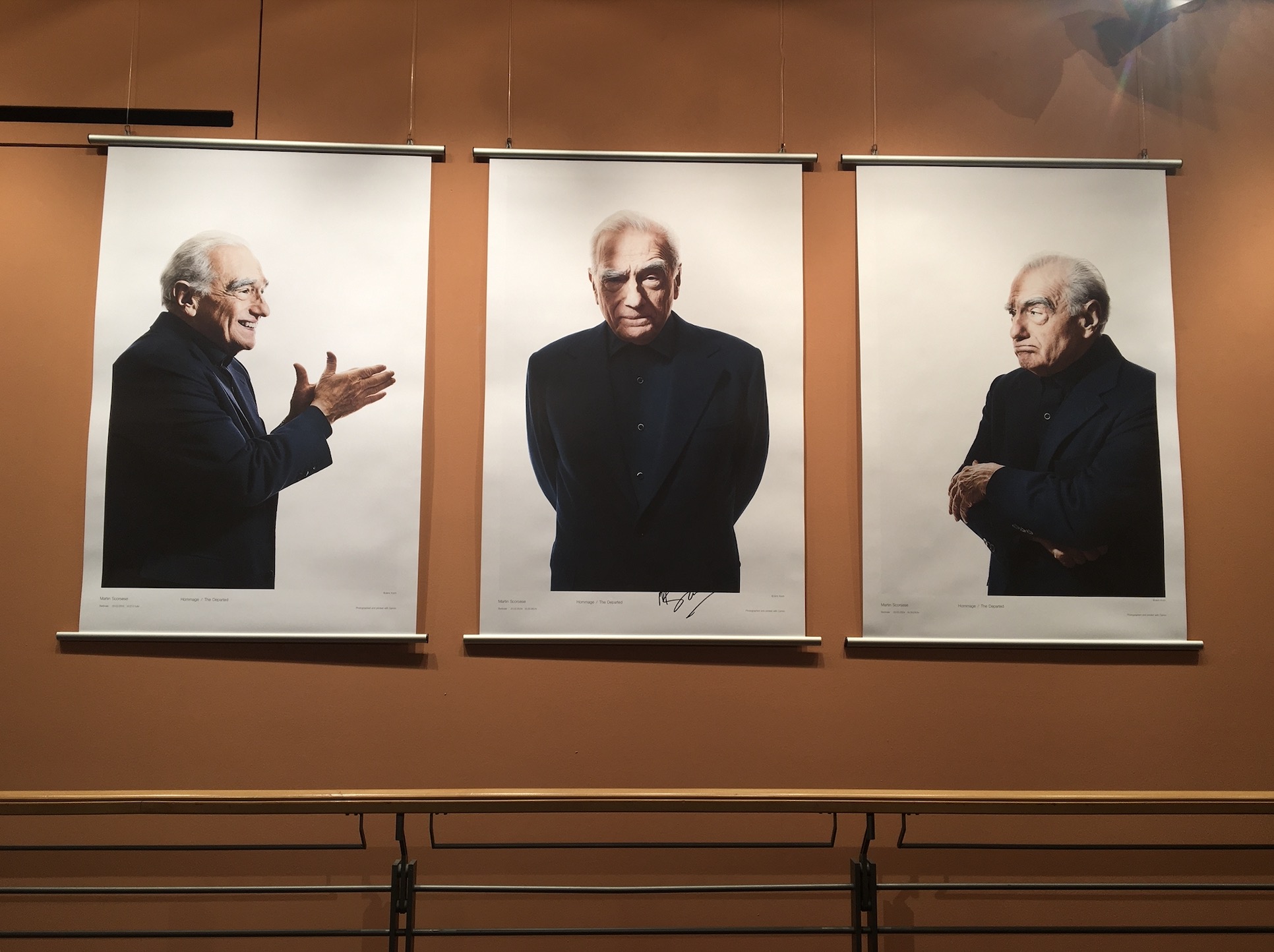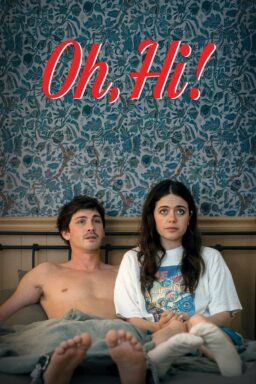(Pictured: Portraits of Martin Scorsese at the Berlinale Palast. As filmmakers and cast members enter the theater for screenings, they autograph the photos—a process that the audience inside watches on the big screen.)
Keeping up with Martin Scorsese at the Berlin Film Festival has been a full-time job. On Tuesday night, the director received an honorary Golden Bear following a heartfelt introduction by Wim Wenders, who told a story of how he rescued Scorsese and Isabella Rossellini from a flat tire as they drove to Monument Valley in the late 1970s. The award presentation was followed by a showing of “The Departed,” which, along with “After Hours,” was screening at the festival in a sort of dual tribute to the cinematographer Michael Ballhaus, a Berliner and longtime collaborator of Scorsese’s. The next day, throngs of the ticketless hoping to catch a sold-out onstage conversation between Scorsese and the filmmaker Joanna Hogg were turned away. And incidentally, Scorsese was here with a new feature—not one he directed, technically, but one in which his insight and love of movies suffuse every minute.
That feature is the documentary “Made in England: The Films of Powell and Pressburger,” directed by David Hinton and “presented” by Scorsese, who serves as an on-camera guide. (He and Michael Powell’s widow, the editor Thelma Schoonmaker, are also among the executive producers.) It’s very much in the spirit of the documentary “A Personal Journey With Martin Scorsese Through American Movies” (1995). Scorsese synthesizes history with his own reflections on films that have meant the world to him.
He begins by noting that “The Thief of Baghdad” (1940), on which Powell was one of three credited directors, provided some the first images that he remembers seeing. Scorsese has returned to these movies over the years: “The longer I live, the stronger grows my sense of what the characters are feeling,” he says of “The Life and Death of Colonel Blimp” (1943). “The Red Shoes” (1948) was the first time he saw Powell and Emeric Pressburger’s famous Archers logo in color, as opposed to on a black-and-white TV. And “The Tales of Hoffmann” (1951), Scorsese says, is “as close to pure expression as cinema can get.”
But even longtime fans of Powell and Pressburger—who did what, in terms of writing, directing and producing, was initially part of the mystery that attracted the young Scorsese—may be surprised and moved at just how much they learn from “Made in England,” and at the range of Scorsese’s analysis. (If he weren’t one of our greatest filmmakers, he would be one of our greatest film critics.) Over the close-up of Kathleen Byron applying lipstick at the climax of “Black Narcissus” (1947), Scorsese describes how “sex erupts into the story through the use of color.” He explains how the ballet in “The Red Shoes”—an experiment in what Powell called “composed film,” in which, starting with a lengthy dialogue-free stretch in “Black Narcissus,” sequences were shot to match music—influenced his subjective approach to showing boxing in “Raging Bull.”
Scorsese recalls that when he first met Powell, he showed him “Mean Streets.” Powell was complimentary but claimed to have gotten “tired of the red,” not realizing that the use of that color was drawn from Powell’s influence. But clearly much of what Scorsese finds so affecting about the Powell-Pressburger oeuvre lies in its philosophy of creativity. The films represent a degree of freedom rare in cinema; they embody, both in form and content, a profound ethos about the risks of making art. In “The Red Shoes,” Scorsese says, art making “is not a choice, but a compulsion.” The protagonist of “Peeping Tom” (1960), he notes elsewhere, “feels truly alive and at home only in the images he creates, built from the destruction of others.”
Scorsese has long been instrumental in championing and restoring Powell and Pressburger’s films. (And many others’: At the tribute, Wenders called Scorsese’s Film Foundation “a Noah’s Ark of film heritage.”) But “Made in England,” which goes nearly feature by feature through their careers, is a stunning compendium that gets to the heart of what made the pair unparalleled in British cinema and so inspiring to the filmmakers of Scorsese’s generation who discovered them.
That generational transition also figures in near the end of another movie-themed documentary at Berlin, “Henry Fonda for President,” directed by the Austrian film curator Alexander Horwath. The title comes from a 1976 episode of “Maude” in which Bea Arthur’s character is determined to get Fonda, who appears in the episode as himself, drafted as a candidate for a president. The episode, Horwath’s documentary notes, aired two weeks before “Taxi Driver” opened, and the societal changes as Fonda’s Hollywood gave way to Scorsese’s are among the many subjects of this idea-rich three-hour film. (Horwath also notes that in “The Grapes of Wrath” and “Easy Rider,” Henry Fonda and Peter Fonda, his son, drove in opposite directions over the same bridge connecting Arizona and California, in a sort of visual passing of the torch.)
Broadly speaking, “Henry Fonda for President” uses Fonda as an avatar for exploring how America has viewed itself. At various times, Fonda played a future president (“Young Mr. Lincoln”), a presidential candidate (“The Best Man”), and an occupant of the oval office (“Fail Safe”). In the same year, 1957, he played characters on opposite sides of the trial system in “The Wrong Man” and “12 Angry Men.” His portraits of the Great Depression (“The Grapes of Wrath”) gave way to portraits of postwar anxiety (“Daisy Kenyon”), and eventually to “Once Upon a Time in the West,” in which Fonda could no longer be trusted to be the hero.
And in his personal life, Fonda remained committed to leftist, anti-fascist causes. Horwath, who interweaves Fonda’s biography, the story of Fonda’s family in America, and broader historical currents, is able to have Fonda to speak in his own words through audio of interviews that the actor gave in 1981 to the writer Lawrence Grobel. Fonda sometimes comes across as a cold fish. But in what amounts to the film’s thesis, Horwath says that the actor was an auteur, even if he didn’t realize it.
Accepting the honorary award, Scorsese spoke of being in conversation with other filmmakers over the years—of watching one another’s works and debating them, and of how the loneliness of making art was balanced by a feeling of community. “The work that we do individually is part of a great, ongoing, ultimately endless conversation—endless, endless and timeless,” Scorsese said. The idea that films can serve as a continuing dialogue between the past and the present permeates both documentaries.












